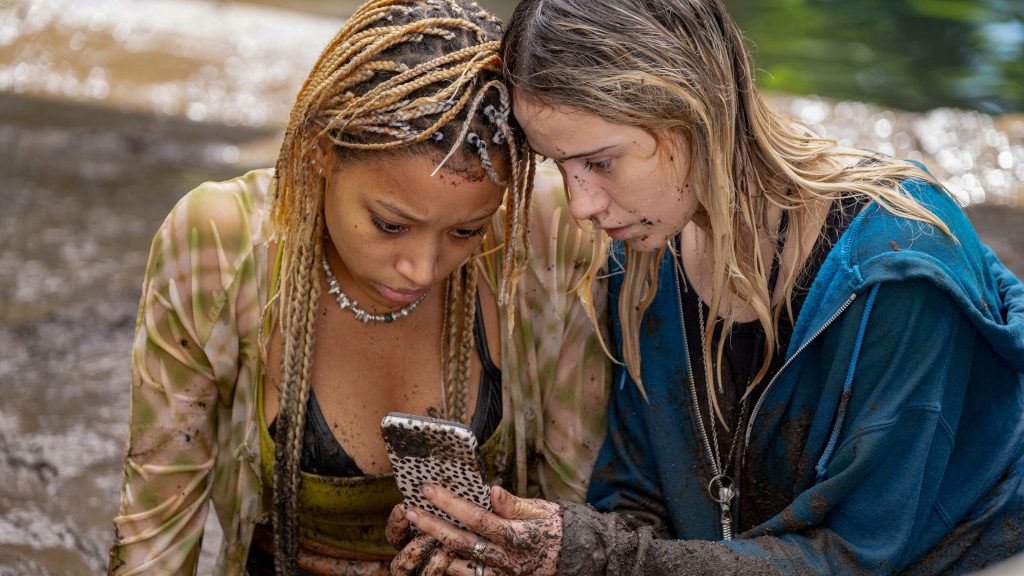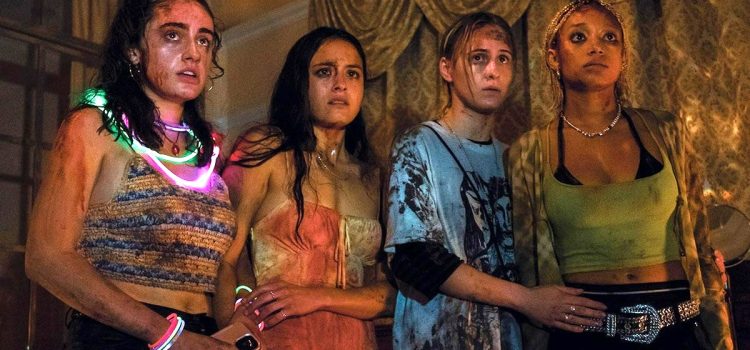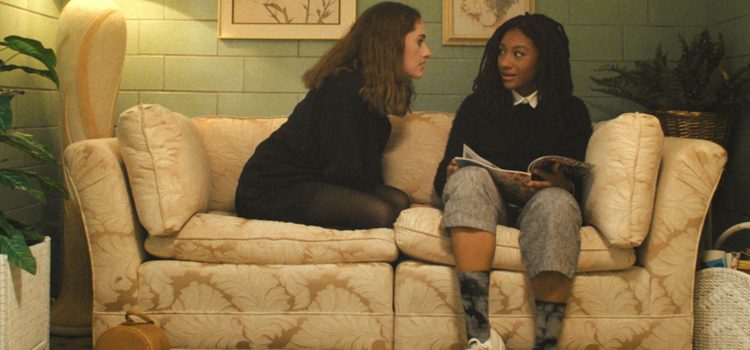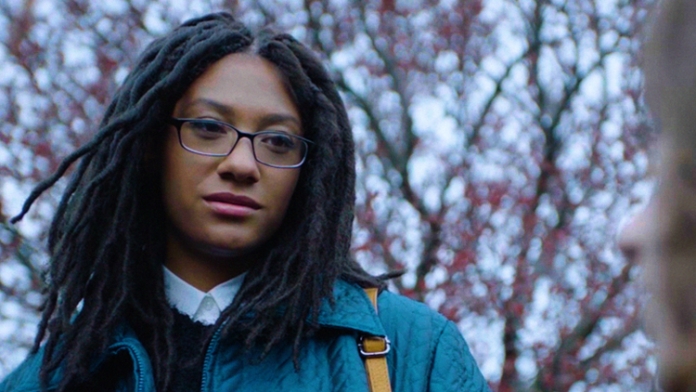By Alex McPherson
Sharp and cynical with plenty on its mind, director Halina Reijn’s “Bodies Bodies Bodies” delivers an unpredictable, ruthless, and highly entertaining experience.
Taking place in today’s age of Twitter and TikTok, the film centers around a “hurricane party” that goes dreadfully wrong. Sophie (Amandla Stenberg), a recovering addict who doesn’t text much in the all-powerful group chat, brings along her new boo, Bee (Maria Bakalova), a soft-spoken immigrant who’s less financially well-off than the rest of the gang. They’re heading to a mansion owned by the parents of David (Pete Davidson), who is trying desperately to seem manly.
Also present are David’s insecure-actor-girlfriend, Emma (Chase Sui Wonders), gregarious and “woke” podcaster Alice (Rachel Sennott), Alice’s much-older boyfriend, Greg (Lee Pace), and the enigmatic Jordan (Myha’la Herrold), whose snide remarks invite suspicion early on. David, Emma, Alice, and Jordan — most with their own fraught history with Sophie — are weirded out that Sophie decided to show up to the party at all, setting the stage for plenty of tea to be spilled.

After most of the lot is sufficiently drunk and coked-up, the music blares, the storm rages, and Sophie suggests they play “Bodies Bodies Bodies.” First, everyone sits in a circle, takes a shot, and punches the person to their left — which, unsurprisingly, becomes emotionally charged, despite frequent reminders that they’re just doing it for funsies.
Then, they play a variation on the Murder in the Dark formula where a “killer” is selected, the lights go out, someone is tagged, and the players regroup to debate who did it. Unfortunately, the real bodies soon start piling up. With the wi-fi out, the Gen-Zers — plus 40-year-old Greg — revert to their dangerously self-absorbed tendencies, amplifying their petty conflicts into life-and-death stakes as they try to locate the true killer.
“Bodies Bodies Bodies” might not be for everyone, especially older folks, but Reijin’s suspenseful, layered, and memorable film expertly threads a needle where humor intertwines with tragedy. It doesn’t hurt that the entire cast absolutely nails their respective roles, bringing pathos to characters who often make narcissistic decisions to mask their insecurities.
Indeed, “Bodies Bodies Bodies” doesn’t paint flattering portraits of any of them, but portrays them as lost souls so wrapped up in privilege and self-centeredness that strong communication is thrown to the wayside. Their dialogue — pervasively deploying topical buzzwords like “woke,” “ally,” “triggered,” “gaslight,” and more — provides plenty of laughs, but operates on a deeper metaphorical level as well.
Their exaggerated personalities represent a distillation of social media’s anti-social repercussions and their shelteredness from the outside world. They lack the skills, willingness, and intelligence necessary to evaluate the situation rationally, at the same time twisting those aforementioned buzzwords to apply to themselves, zapping them from meaning, and blowing up their “drama” so much that it turns to downright animalism.

That the film is still often hilarious is an achievement in itself, thanks to Sarah DeLappe’s screenplay and the whole cast. Sennott, memorable in “Shiva Baby,” once again shows her knack for comedic timing in several tirades that are simultaneously eye-rolling, gut-bustingly funny, and concerning, as this pressure cooker of a film continues to gain steam.
Davidson brings his usual off-kilter shtick with some genuinely uncomfortable moments sprinkled in, exemplifying the film’s tonal shifts from ridiculous to shocking. Pace is also great as Greg, a Gen-Xer more separated from the others’ worldviews.
Bakalova, who was so good in “Borat Subsequent Moviefilm,” brings an air of mystery and maybe-innocence to the character of Bee, from whose perspective the film largely takes place. Bee, the odd one out, is essentially trapped with a bunch of crazy people, but has her own secrets nevertheless that paint a target on her back.
Wonders, as Emma, effectively conveys her cattiness and fragility. Stenberg gives a stellar performance, rendering Sophie one of the more multifaceted partygoers, her naivete creating more issues than solutions. Herrold is perhaps the standout of them all, lending a stern calculation to Jordan’s actions largely fueled by economic and romantic anxieties.
As the chaos ensues, Jasper Wolf’s claustrophobic, handheld cinematography, with many scenes lit by glow-sticks and smartphone flashlights, fits the proceedings like a glove, underlining the long-held resentments between the “friends.” The electronic-sounding score, by Disasterpiece, is fittingly paranoid and jumpy, reflecting the digital sphere turning into a figurative warzone. The soundtrack, including a track by Charlie XCX, is laced with irony.
No spoilers here, but the final reveal is perfect, reframing everything that came before in new light that should benefit repeat viewings. Taken as a whole, “Bodies Bodies Bodies” is far more than a mere cringe-comedy or a seen-it-before slasher movie. Rather, this is a satire with real bite, demonstrating a thesis that resonates in our increasingly divided reality.

“Bodies Bodies Bodies” is a 2022 horror comedy thriller directed by Halina Reijin and starring Rachel Sennott, Maria Bakalova, Pete Davidson, Lee Pace, Myha’la Herrold, Amanda Stenberg and Chase Sui Wonders. Rated R for violence, bloody images, drug use, sexual references and pervasive language, its run time is 1 hour, 34 minutes. It opened in theaters Aug. 5. Alex’s Grade: A
Alex McPherson is an unabashed pop culture nerd and a member of the St. Louis Film Critics Association.




